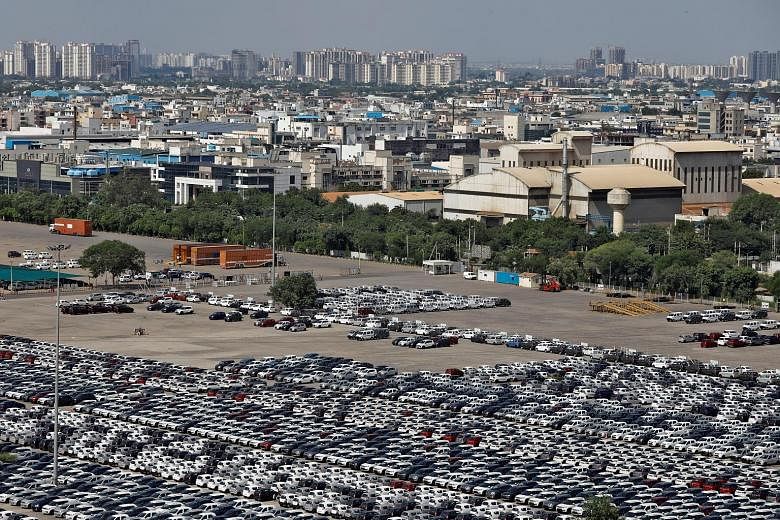The southern city of Chennai is often known as the Detroit of India.
And not without reason.
It is home to the manufacturing units of top carmakers like Hyundai, Ford, BMW, Nissan and Renault, two-wheeler leaders TVS, Yamaha and Royal Enfield, truck and tractor makers Ashok Leyland and Tafe, and a whole ecosystem of auto-component makers.
Many, though, are now anxious about the future of Chennai's status as an auto hub.
Vehicle manufacturers in India say they are experiencing the worst downturn in 25 years. Sales have fallen for the 10th consecutive month, with August registering 31 per cent less sales than a year earlier. September may not have fared much better. Major companies reported a double-digit drop in their August sales. In the last three months, they have stopped production for five to 15 days a month.
Maruti Suzuki, which enjoys the biggest market share in India, suffered a whopping 34 per cent drop in sales in August, and its Haryana plants announced their first two no-production days.
Auto company promoters and shop-floor workers alike fear an extended crisis could be devastating for the sector.
India's motor vehicle sector is the world's fourth-largest but as domestic demand plummets, carmakers have halted production intermittently until their dealers can clear unsold stock.
Most companies are now offering discounts ahead of Deepavali later this month.
Others are pushing new launches. Hyundai's director of production, Mr Ganesh Mani, said it is servicing export orders early to use idle shop floors.
But nothing seems to be working.
JOBS ON THE LINE
Those immediately affected are contract workers. Mr Palani, 35, who has served meals at the canteen of Ashok Leyland's Ennore factory for 20 years as a "temporary worker", lost half his monthly wage last month when the plant was shut for 16 days.
"If I get only 7,000 rupees (S$136) a month, how will I pay my rent and school fees for my kids?" he said.
Mr Narayanan, secretary of the factory workers' union at the Ennore plant, said it had 1,500 permanent workers and 2,300 on contract. "Temp workers are already suffering. But if this slowdown deepens, permanent workers may be let go too," he said.
This slump is "deeper and more complex" than the previous ones in 2009 and 2014, said Mr Ram Venkatramani, director of auto-component maker India Pistons, which has cut 10 to 12 per cent of its workforce. Another prominent component manufacturer, Rane Group, called it the first overall crash - of commercial vehicles, two-wheelers, passenger cars and tractors.
REASONS FOR SLOWDOWN
The Society of Indian Automobile Manufacturers (Siam) has pinned the downturn on rising taxes. It wants the GST, a single-point goods and services tax regime levied at 28 per cent on motor vehicles, to be slashed to 18 per cent.
But many industry analysts say the crux of the slowdown is a slew of government policies that have made vehicles more expensive and potential buyers poorer.
"Costs are growing, but the consumer's income is not," said Mr Anil Sharma, an auto industry analyst from research firm Markets and Markets. Uncertainty around elections in May this year, a poor monsoon last year, and the after-effects of 2016's demonetisation, when the government withdrew 1,000-and 500-rupee notes overnight, "had a profound negative impact on medium-sized and small enterprises and the rural economy", Mr Sharma added.
Liquidity is also low because after the 910 billion rupee debt default of infrastructure lending giant Infrastructure Leasing and Financial Services last year, banks are reluctant to extend consumer loans to dealers.
As for commercial vehicles, an early 2018 policy increased permitted axle load by 25 per cent. "Carrying more per truck in effect reduced demand for more trucks," said Mr Ram of India Pistons.
In addition, the auto sector is in the midst of a major technological overhaul.
New emission norms in line with European Standard VI - called BS-VI in India - will come into force in April next year. This leaves the industry with less than a year to rejig assembly lines entirely. All vehicles using older technology will have to be sold by next April.
The government is also shifting to high gear on electric vehicles by giving a tax exemption for buyers and announcing policies for faster adoption. Two-wheelers, for example, are to go fully electric by 2025.
"The policymakers may have played the electric vehicle card too ambitiously without looking at ground preparedness," Rane Group chairman L. Ganesh said.
After worried industry representatives met Finance Minister Nirmala Sitharaman, she tried to boost sales by lifting a recent ban on the purchase of new vehicles by government departments, and allowing an extra 15 per cent depreciation on vehicles until March next year.
She also lowered corporate income tax for domestic manufacturers from 30 to 22 per cent.
Now, all eyes are on October's festive season, which usually accounts for a third of annual sales.

